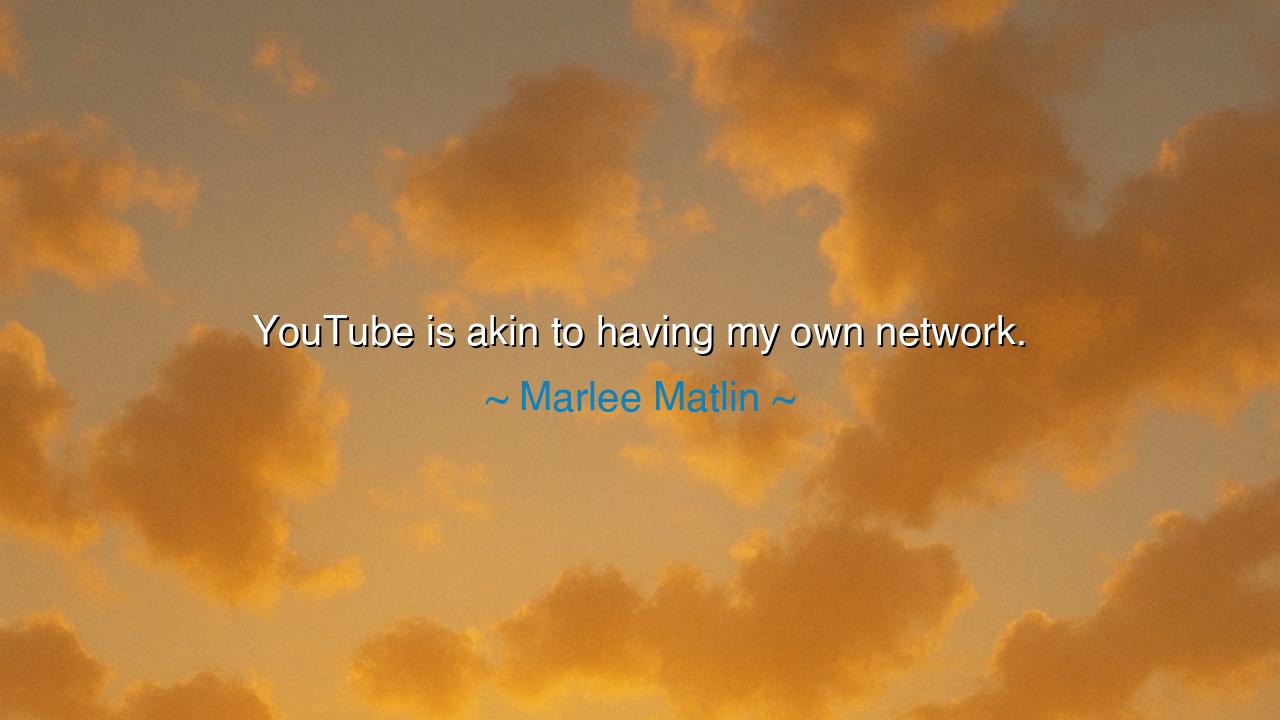
YouTube is akin to having my own network.






Hear the words of Marlee Matlin, actress, pioneer, and voice for the deaf community, who declared: “YouTube is akin to having my own network.” These words, though simple, carry the weight of centuries of struggle for expression. For they speak of the transformation of power in the age of the Internet—an age when the gatekeepers of television and film no longer hold the keys to the voices that may be heard. Matlin’s declaration is both triumphant and liberating: that a single individual may now command a stage once reserved only for the mighty.
In the old world, a network was a fortress. Only a few chosen voices could pass within its walls. To reach the ears of the many required permission from producers, executives, and corporations. The cost of entry was vast, and for those outside the narrow channels—women, minorities, the disabled, the marginalized—access was often denied. Yet with the rise of YouTube, the fortress walls crumbled. The stage of the world was placed in the hands of anyone with a camera, a story, and the will to share. What was once scarce became abundant, and what was once denied became possible.
Consider the story of Matlin herself. As the first deaf actress to win the Academy Award, she shattered barriers in Hollywood, yet even she faced the limits of traditional media—roles were few, opportunities narrow, and control rested with others. With YouTube, she saw a new horizon: a place where she could shape her own message, connect directly with her audience, and bypass the gatekeepers of old. This is why she likened the platform to having her own network—a source of independence, freedom, and creative sovereignty.
History has seen similar transformations before. When Gutenberg’s press broke the monopoly of the scribes, ordinary men and women could print their own words, their own visions. Pamphlets carried revolutions, poetry spread across borders, and voices once silenced rose in power. In the same way, YouTube gave modern creators their own press, their own broadcast, their own power to reach the multitude. No longer must they wait for permission; they may speak, and the world may hear.
The deeper meaning of Matlin’s words lies not only in technology, but in empowerment. For those once excluded from mainstream networks, YouTube and platforms like it are more than entertainment—they are liberation. They give a platform to the voiceless, a stage to the unseen, and a chance for every individual to become not only consumer but creator. To have one’s own network is to reclaim control over one’s narrative, one’s identity, and one’s impact on the world.
Yet with this power also comes responsibility. A network is not only a stage for truth but also a channel for deception, distraction, and noise. To wield such a tool with wisdom requires clarity of vision and integrity of purpose. Matlin’s example reminds us that the greatest use of these new networks is not vanity, but service—to uplift, to teach, to connect, to inspire. Just as she used her platform to advocate for accessibility and inclusion, so too must we use ours to carry forth messages worthy of the ears that receive them.
The lesson for us is clear: do not wait for permission to share your story. The age of the gatekeepers is passing, and the power to reach others lies already in your hands. Use platforms like YouTube not merely for distraction, but as your own network—a stage to reveal your truth, to show your craft, to connect with others across the wide world. For in this age, each of us has the chance to be more than spectator; each of us may be creator, teacher, and builder of community.
Thus the words of Marlee Matlin resound like a trumpet of liberation: “YouTube is akin to having my own network.” Hear them not only as her triumph, but as an invitation to all: to step onto the stage of the digital age, to tell your story, to claim your voice, and to shape the world with the power of your own network. For never before in history has the individual had such power—may you wield it with courage and with wisdom.






AAdministratorAdministrator
Welcome, honored guests. Please leave a comment, we will respond soon